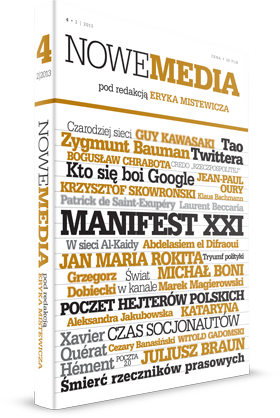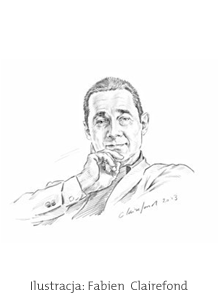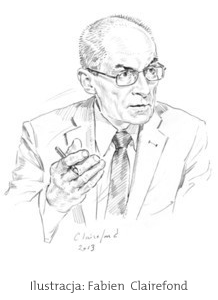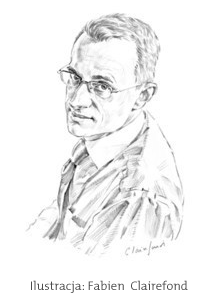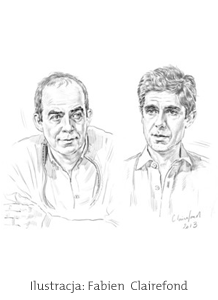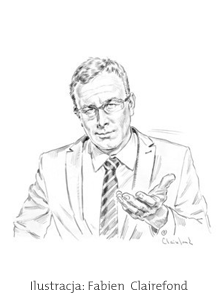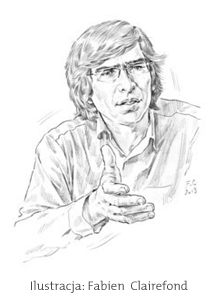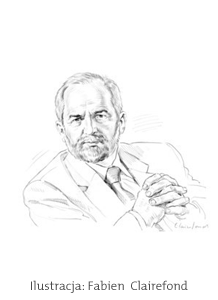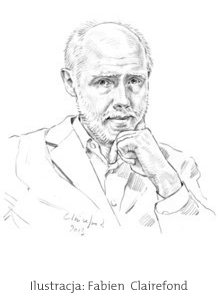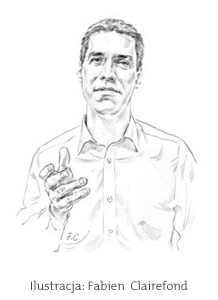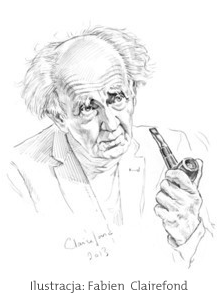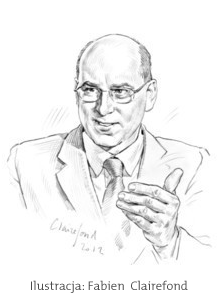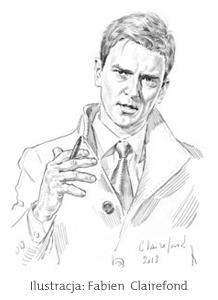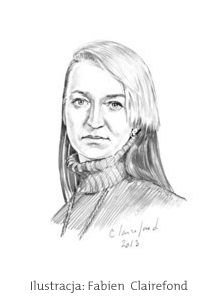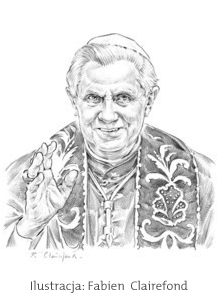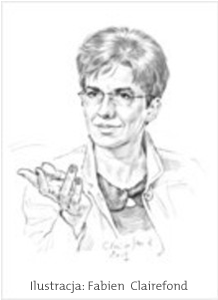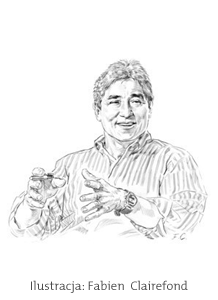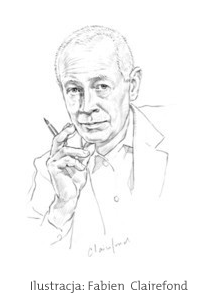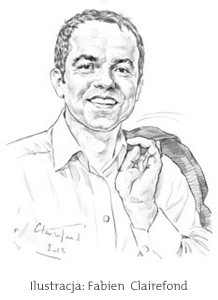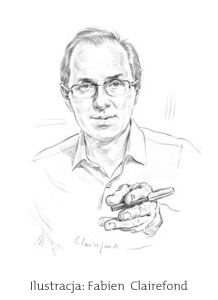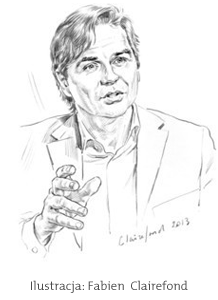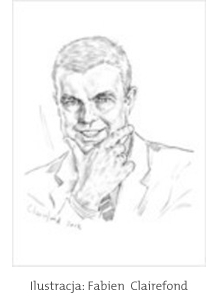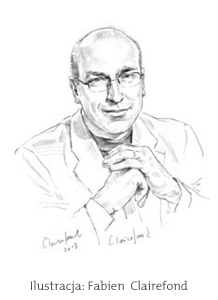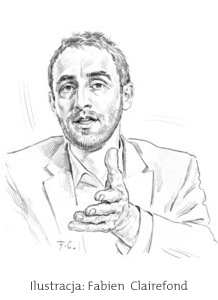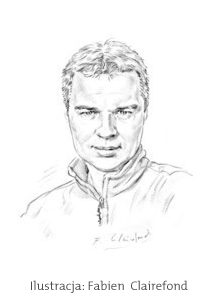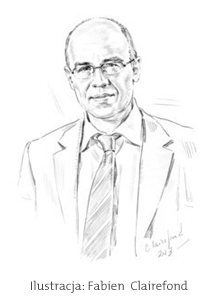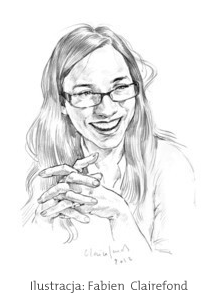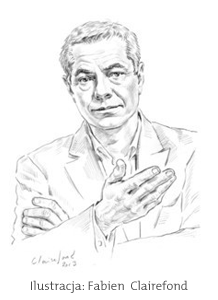Nowe Media nr 4
(4/2/2013)
Najtrudniejsze w przygotowywaniu kwartalnika opinii jest wypośrodkowanie między tym, co już dla wszystkich, a przynajmniej dla większości, oczywiste, a tym, co jeszcze niezrozumiałe, dalekie, obce.
Tematów wciąż przybywa. Mówienia tak, aby być usłyszanym; usłyszenia tego, co dla nas najważniejsze, co determinuje nasz sukces towarzyski czy biznesowy; nieutonięcie w natłoku informacji.
Tematów jest multum, autorów niestety mniej. Ludzi, którzy próbują zrozumieć metapoziom nowych mediów, którzy nie zatrzymują się na najprostszym poziomie recenzji nowych gadżetów, technologicznych nowinek. Szukamy najlepszych praktyków i teoretyków, ludzi z doświadczeniem i wizją, będących w stanie postawić najbardziej trafne pytania, szukać odpowiedzi. I – to chyba najważniejsze – idąc drogą, po której nikt wcześniej nie szedł, swoimi poszukiwaniami, proponowanymi rozwiązaniami, opiniami, inspirując naszych Czytelników.
wydanie papierowewydanie elektroniczne
Spis treści
Tu strzelają, ale nie wiadomo dlaczego, Klaus BACHMANN
Profesor politologii Szkoły Wyższej Psychologii Społecznej, w latach 1988–2001 korespondent mediów zagranicznych w Europie Środkowo-Wschodniej i 2001–2004 w Brukseli. Specjalizuje się w zagadnieniach dotyczących integracji europejskiej i transformacji politycznej. Ostatnio ukazała się jego książka o międzynarodowych trybunałach karnych dla byłej Jugosławii i dla RWandy. Uczestniczy w projektach dotyczących demokratyzacji Tunezji, transformacji krajów byłej Jugosławii i Afryki.
Oto poruszający tekst o tym, jak zrozumieć świat, gdy nie ma już prawdziwego dziennikarstwa, prawdziwych reporterów. Mamy lepsze narzędzia przekazywania informacji niż kiedykolwiek wcześniej w historii – i gorsze informacje. Spadający samolot pokazywany jest przez stacje telewizyjne świata jako ilustracja niezrozumiałego konfliktu tylko dlatego, że dobrze i długo spada, nic więcej. Oto tekst o tym, gdzie są dziś najpoważniejsze do niedawna media. I gdzie będą jutro, w epoce nowych mediów.
ABSTRACT: The revolution has been on since the late 1990s and brought a few phenomena that are, paradoxically, viewed mostly positively: fast development of the Internet and web-based social networks. These phenomena contributed to a crisis of traditional print media while allowing the press, radio and television to survive. On the one hand, young generations and advertisers moved to free web media, dramatically reducing traditional revenues of press, TV and radio, and on the other, the Internet has provided them with tools for fast and almost cost-free sourcing of real-time information. It is far from surprising that traditional media were affected less than press agencies, whose intermediary services became almost completely unnecessary. Correspondents’ role, too, diminished in importance, especially so with foreign correspondents. Here is a touching text on how to understand the world without real journalism and real reporters. We have better information transmission tools than ever before and the worst information ever.
RESUME: La révolution engagée à la fin des années 1990 englobe deux phénomènes, dont la perception – paradoxalement – est essentiellement positive: l’explosion de l’internet et la montée en puissance des réseaux sociaux. D’un côté, ils ont contribué à la crise des médias imprimés classiques; de l’autre, ils ont assuré la survie de la presse, de la radio et de la télévision. Les jeunes et les annonceurs se ruent sur les médias en ligne gratuits, en faisant diminuer drastiquement les revenus de la presse, de la radio et de la télévision, car l’internet apporte des outils permettant de se tenir au courant rapidement et presque sans frais. Les grands perdants ne sont donc pas les médias traditionnels, mais les agences de presse, dont l’intermédiaire est devenu tout à fait superflu. Et avec eux, les correspondants, notamment les correspondants à l’étranger. Comment comprendre le monde sans journalistes et reporters véritables? Alors que les outils de transmission d’informations sont les plus performants de l’histoire, la qualité de l’information n’a jamais été si mauvaise.
Świat w kanale, Grzegorz DOBIECKI
Z wykształcenia prawnik, dziennikarstwa uczył się w Polskim Radiu. Po stanie wojennym znalazł się we Francji i został tam na 26 lat. Pracował w Radio France Internationale i emigracyjnym „Kontakcie” (m.in. prowadził magazyny Video-Kontaktu, nagrywane na kasetach i przemycane do Polski). Od 1991 r. był kolejno paryskim korespondentem TVP i „Rzeczpospolitej”, specjalnym „planetarnym” reporterem RMF FM, stałym współpracownikiem „Polityki”. Od 2008 r. w Polsat News, gdzie prowadził magazyn „To Był Dzień na Świecie”, zastąpiony przez niedzielny „Tydzień na Świecie”. Nominowany w 2013 r. (przez kapitułę) do telewizyjnej Nagrody Wiktora w kategorii publicysta/komentator.
Społeczność sieci ogłosiła, że to koniec dziennikarstwa w Polsce. Ostatni codzienny program dotyczący świata schodzi z anteny. Bynajmniej, nie program stacji publicznej, z misją i abonamentem, ale stacji komercyjnej, bo „To Był Dzień na Świecie” stanowił intelektualną ucztę dla widzów Polsat News. Dziś to już program cotygodniowy, bo media się zmieniają. O tym, dlaczego się zmieniają i jak głęboka to zmiana – Grzegorz Dobiecki.
ABSTRACT: The web community has announced the end of journalism in Poland: the last daily programme on international affairs comes off the air. “To Był Dzień na Świecie” is an intellectual feast for the spectators of Polsat News. Now it has been reduced to once a week because the media are changing. Foreign news is something different from international journalism. It can be dealt with, put together and presented by any TV journalist who speaks more or less English. But knowing the context and background information is another piece of cake.
RESUME: La cybercommunauté annonce la fin du journalisme en Pologne: la dernière émission quotidienne consacrée à l’actualité mondiale a quitté l’antenne. «Une journée dans le monde» était un régal intellectuel pour les téléspectateurs de la chaîne Polsat News. Aujourd’hui, c’est une émission hebdomadaire, car les médias évoluent. L’actualité internationale devra désormais se passer de commentaires. Or, si les informations étrangères peuvent être traitées, montées et présentées par n’importe quel journaliste de télé comprenant tant bien que mal l’anglais, le contexte et les dessous des faits ne sont pas connus de tous.
Case study: w poszukiwaniu watykanisty, Marek MAGIEROWSKI
Publicysta tygodnika opinii „Do Rzeczy”. Od 2006 do 2011 r. zastępca redaktora naczelnego „Rzeczpospolitej”. Współpracuje z miesięcznikiem „W drodze”, „Przeglądem Katolickim” i portalem „Nowa politologia”. Wcześniej pracował m.in. w „Newsweeku”, „Forum”, „Gazecie Wyborczej” i „Uważam Rze”. Z wykształcenia iberysta.
„Powiększa się przepaść między coraz słabszymi merytorycznie komercyjnymi telewizjami informacyjnymi, coraz nudniejszymi gazetami, a np. specjalistycznymi, nierzadko niszowymi portalami internetowymi, które traktują swoich konsumentów z dużo większą atencją, choć ich zasięg czy potencjał finansowy jest nieporównywalny z zasobami wielkich stacji” – pisze Marek Magierowski, jeden z najpoważniejszych polskich dziennikarzy, uważny obserwator rynku mediów. A punktem wyjścia jest sposób relacjonowania wydarzeń w Watykanie.
ABSTRACT: Once it was hard to conceive of a man amusing TV audience with stories about double-headed cows and clips with people slipping on a banana peel to seriously report on the conclave just a few days later. Today it is just the reality. There is a deficit of experts who could speak for a given newspaper or a TV channel and describe news from the Vatican, Moscow or Beijing in a competent way. Many outstanding journalists left journalism to work in think tanks or the business sector. Quite often, they do not want to have anything to do with their previous careers. However, experts can be found in many other fields. Unfortunately, though, media, and particularly TV stations, do little to find them. Executive producers prefer a list of popular names, also because “new faces” could bore viewers with their overly in-depth statements. This practice was clearly visible during the recent reporting on the conclave in the Polish media.
RESUME: Autrefois, il était inimaginable que la même personne puisse d’abord amuser les téléspectateurs avec des histoires de vaches à deux têtes et des vidéos de glissades sur une peau de banane, pour, quelques jours plus tard, air sérieux, discuter du conclave. Aujourd’hui, c’est la réalité. Il manque de spécialistes capables de représenter un journal ou une chaîne de télévision et commenter avec compétence l’actualité du Vatican, de Moscou ou de Pékin. Nombre de journalistes éminents ont quitté la profession pour des think tanks ou le monde des affaires. Souvent, ils ne veulent plus entendre parler de leur ancien métier. Mais on peut trouver des experts ailleurs. Malheureusement, les médias, surtout les chaînes de télévision, ne se donnent pas la peine de chercher. Il est plus facile de prendre un carnet avec des noms connus : les nouveaux visages risqueraient d’ennuyer le public avec leurs commentaires trop sérieux. Ce procédé a été surtout utilisé par les médias polonais pendant le conclave.
Manifest XXI, PATRICK DE SAINT-EXUPÉRY I LAURENT BECCARIA
Patrick de Saint-Exupéry
Syn hrabiego Jacques’a de Saint-Exupéry’ego i hr. Martine d’Anglejan. W ślad za pasją Antoine’a de Saint-Exupéry’ego, pisarza i lotnika, autora „Małego księcia”, wybrał zawód dziennikarza. Od 19. roku życia pracował, pisząc reportaże ze świata dla „France Soir”, „L’Express”, „Grands Reportages”, „Le Figaro”. Nagłośnił m.in. ludobójstwo w Rwandzie. Od 2008 r. z Laurentem Beccarią tworzy magazyn reporterski „XXI”, zaś od 2011 r. magazyn reportaży fotograficznych „6Mois”.
Laurent Beccaria
Syn Yves’a i Marie Josèphe Denoix de Saint Marc, założycieli grupy Bayard Presse. Były dyrektor literacki największych francuskich wydawnictw Plon i Stock. W 1997 r. stworzył wydawnictwo Les Arènes. Absolwent paryskiej Sciences Po. Studiował dziennikarstwo, ALE porzucił studia, uznając je za niewiele wnoszące.
Najważniejszy, najszerzej dyskutowany w Europie dokument dotyczący przyszłości dziennikarstwa. O błędach popełnianych przez media, o cyfryzacji wyostrzającej kryzys, wreszcie o czekającym media przewrocie kopernikańskim – powrocie do źródeł, do rozmowy z czytelnikami, nie reklamodawcami. Z Patrickiem de Saint-Exupéry’m uznaliśmy, że nad tezami tego tekstu warto rozpocząć poważniejszą debatę także w Polsce. Otwieramy łamy „Nowych Mediów” na dyskusję: recenzje, uwagi, polemiki. Zapraszamy do debaty.
ABSTRACT: The most important and Europe’s most debated document on the future of journalism today. On the mistakes of today’s media, digitalisation that has not caused the media crisis yet merely made it more prominent, and media’s facing a Copernican Revolution – a return to the roots, to a dialogue with readers rather than advertisers.
RESUME: Un texte sur le futur du journalisme le plus important et le plus largement discuté aujourd’hui en Europe. Sur les erreurs des médias actuels ; sur la numérisation, qui n’a pas provoqué la crise des médias, mais l’a aggravé ; sur la révolution copernicienne enfin, laquelle forcera les médias à retourner aux sources – au dialogue avec les lecteurs, et non pas avec les annonceurs.
Papierowe credo, Bogusław CHRABOTA
Redaktor naczelny „Rzeczpospolitej” od 2 stycznia 2013 r. Dziennikarz, publicysta i pisarz. Urodził się w Krakowie. Ukończył Wydział Prawa UJ. Przez ostatnich 20 lat pracował w Telewizji Polsat, pełniąc w niej m.in. funkcje dyrektora programowego, szefa anteny, dyrektora zarządzającego, szefa kanałów tematycznych, szefa informacji i publicystyki. Debiutował w prasie niezależnej w 1986 r. Do 1989 r. współpracował z różnymi tytułami prasy podziemnej i emigracyjnej. W latach 1990–1993 związany z TVP. Komentator Tok FM i Radia PiN. Autor książek, publicysta prasowy i felietonista. Od 1995 r. wykładowca akademicki (UJ, UW, uczelnie warszawskie – Koźmiński, Łazarski, SWPS). Członek i założyciel Krakowskiego Towarzystwa Przemysłowego (1987). Członek Polskiego Stowarzyszenia Bluesowego.
Poprosiłem szefa „Rzeczpospolitej” o jego credo, pomysł na najpoważniejszy konserwatywny tytuł na polskim rynku prasowym. Bogusław Chrabota wnosi do „Rzeczpospolitej” przynależnej bez granic do świata papieru doświadczenia ze świata szybkiej, „elektronicznej” publicystyki. Wnosi więc wizję i zmianę w stronę online. To moim zdaniem proces warty uważnego obserwowania i pogłębionej analizy.
ABSTRACT: Editor-in-chief of “Rzeczpospolita”, a major conservative title on the Polish daily press market, says: “I was making electronic media. I succeeded in surviving the conversion of the analogue model into the digital one without losses to news and journalism meant as a public mission. I think that the saving of the great title such as “Rzeczpospolita” has been a mission equally noteworthy. This has been undoubtedly more difficult, though I have never shunned challenges. For the last ten years, journalistic practice has shifted towards electronic media, maybe, then, it is a good idea to bring some of this light of professionalism now into the print. I try to and get an impression that it is slowly beginning to work out.
RESUME: Le rédacteur en chef de “Rzeczpospolita”, le plus important journal conservateur polonais, écri: «J’ai fait de la presse électronique. J’ai réussi à survivre au passage de l’analogique au numérique sans dommage tant pour le côté information qu’opinion, soit pour le service public. Sauver un titre aussi important que Rzeczpospolita est pour moi une mission tout aussi louable. Plus difficile, certes, mais je n’ai jamais fui les difficultés. Ces dernières dix années, notre métier a évolué vers les médias électroniques, donc peut-être c’est une bonne idée de faire profiter la presse imprimée de cette lumière reflétée de professionnalisme. J’essaie de le faire. Et j’ai l’impression d’avancer, peu à peu.»
Radio to społeczność słuchaczy, Krzysztof SKOWROŃSKI
Twórca Radia Wnet www.radiownet.pl, 106,2 Mhz w Warszawie. Wcześniej szef radiowej Trójki, autor programów radiowych i telewizyjnych. Współautor „ABC dziennikarstwa” wspólnie z Tomaszem Lisem i Mariuszem Ziomeckim. Prezes Stowarzyszenia Dziennikarzy Polskich.
Wciąż jestem pod wrażeniem, w jaki sposób Krzysztof Skowroński, osiągnąwszy wszystko w świecie 1.0, w mediach tradycyjnych, sprawnie przeszedł i odnalazł się w świecie 2.0, w świecie nowych mediów. To najgłośniejszy przypadek w Polsce. Nie poddał się, wszedł na nieznany dla siebie teren technologii i sieci, budowy społeczności. Wraz z przyjaciółmi stworzył Radio Wnet. Oto jego opowieść.
ABSTRACT: When I look at today’s traditional media and their torments, I see a lift that keeps going down. Alternately slower and faster, the torments more and less severe, yet the movement is downward all the time. It is quite the opposite with the new media. Though at a pace slower than I would expect, the things are increasingly good and stable. Radio Wnet attracts more and more friends, people helping each other and positive feelings, which is important. Is it better to reach millions with good content rather step into a niche? I often hear that question, yet a single person met here gives much more satisfaction than hundreds there. We are building our radio from scratches, and so anyone is here for a reason, is aware of and understands the things, and is and thinks of themselves as a member of the community.
RESUME: Regarder les médias traditionnels actuels, toujours en peine, c’est comme regarder un ascenseur qui n’arrête pas de descendre. Il va plus vite ou plus lentement, plus ou moins péniblement, mais toujours vers le bas. Pour les nouveaux médias, c’est l’inverse. Ils avancent plus lentement que je ne le pensais, mais toujours plus loin, toujours avec plus de stabilité. La radio Wnet attire de plus en plus d’amis, de personnes voulant s’aider mutuellement, de bonnes émotions. C’est très important. Faut-il faire passer son message à des millions ou plutôt trouver sa niche? On me pose souvent cette question. Or, une personne rencontrée ici vaut des centaines là-bas. Nous avons créé notre radio à partir de zéro, donc chaque personne est ici pour une raison bien précise, qu’elle connaît et comprend, et a le sentiment d’appartenir à une communauté.
Między (nie)zależnością i (nie)odpowiedzialnością, Juliusz BRAUN
Prezes TVP SA. Doktoryzował się z zakresu nauki o mediach na Wydziale Dziennikarstwa i Nauk Politycznych UW. W latach 1983–1989 publicysta Tygodnika Katolickiego „Niedziela”. Od 1989 do 1999 r. poseł na Sejm, przewodniczący Komisji Kultury i Środków Przekazu dwóch kadencji Sejmu. W latach 1999–2005 członek Krajowej Rady Radiofonii i Telewizji, do 2003 r. jej przewodniczący. Autor m.in. „Potęga czwartej władzy”, „Media, rynek, społeczeństwo” oraz „Telewizja publiczna w czasach transformacji”.
Trzy wektory świata nowych mediów to niezależność, odpowiedzialność, język opisu świata – pisze prezes Telewizji Polskiej SA. W tych trzech wektorach pomieścić się muszą dziś i media tradycyjne, i media nowe, blogosfera, zmieniające się media „tekstowe”, media „audio” i media operujące obrazami, jak telewizja. Ciekawe, bardzo inspirujące, zachęcające do dyskusji spojrzenie!
ABSTRACT: The properly understood regulation is not in conflict with independence. There are countries with complex systems of electronic media regulations in which such media enjoy full freedom, and there are those without formal regulations or freedom of media. It is an important question, not only about the works of the media themselves but also the whole system of social communication, not only in terms of independence, but also from the perspective of responsibility for the content published. This is not about being responsible “before someone” – authorities, courts, legislative bodies, but “for something” – something the author makes available to an audience of indefinite size, sometimes much larger than press and TV audiences. A blog, a Facebook account, Twitter – intimate posts, private posts – all of them are more or less consciously disseminated across the globe. The possibility to freely cross state boundaries and address viewers not limited in any way, in real time, without delays, creates a completely new reality. Independence in this case not always coincides with responsibility for the content transmitted. There is yet the third vector coming on top of it: the language we use to describe the world.
RESUME: Bien comprise, la régulation ne nuit pas à la liberté. Dans certains pays, les médias électroniques jouissent de la liberté totale malgré un système de régulation complexe; dans d’autres, il n’y a ni de régulation formelle, ni de liberté des médias. Il faut donc s’interroger sur le fonctionnement non seulement des médias, mais du système de communication sociale dans son ensemble, aussi bien en termes de liberté que de responsabilité pour les contenus diffusés. Il s’agit non pas de la responsabilité devant quelqu’un (une autorité, une juridiction, un régulateur), mais bien de la responsabilité «pour quelque chose» – pour les contenus mis à disposition d’un public illimité, dépassant le nombre de lecteurs de la presse ou de téléspectateurs. Les messages personnels diffusés à travers des blogs, Facebook ou Twitter sont adressés, de manière plus ou moins consciente, au monde entier. La possibilité de passer au-delà des frontières des pays pour toucher en temps réel un public illimité a créé une nouvelle réalité. Une réalité où la liberté n’est pas toujours synonyme de la responsabilité pour les messages transmis. Un autre facteur est aussi en jeu: le langage utilisé pour décrire le monde.
Media biznesowe w dobie Internetu, Witold GADOMSKI
Od 1997 r. w „Gazecie Wyborczej”. Wcześniej m.in. redaktor naczelny tygodnika „CASH”, redaktor naczelny dziennika finansowego „Nowa Europa”, zastępca redaktora naczelnego „Gazety Bankowej”. W latach 80. jeden z założycieli i redaktorów miesięcznika „Niepodległość”.
ABSTRACT: No business medium in Poland, electronic media included, has become powerful enough in its opinion-making to impact economic politics or economic regulations. The prestige of the industry is often compromised by the crypto-advertising or journalists’ having secret job contracts signed with businesses. Today’s databases available on the Web are making business media less and less useful to market professionals. If they use them at all, it is just for the “reading pleasure” (e.g. gossips about their competitors) or to read opinions by credible people. The weaker the financial standing of the medium, the more susceptible to manipulations and less credible it is.
RESUME: En Pologne, aucun titre de presse économique (y compris électronique) n’a acquis l’autorité suffisante pour influencer la politique économique ou le droit des affaires. La crédibilité de ce secteur est entachée par des cas pas si rares de publicité déguisée ou de postes cachés occupés par des journalistes dans des entreprises. Les ressources disponibles sur le web contribuent à réduire l’utilité de la presse économique pour les professionnels. Ils n’y ont recours que pour le «plaisir de lire» (notamment les rumeurs concernant leurs concurrents) ou pour connaître l’avis de personnes crédibles. Plus un titre de presse est faible financièrement, plus il est manipulable et peu crédible.
Wiarygodność informacji jej największą wartością, Olivier GAUDE
Szef Unicomm, najważniejszej dziś we Francji firmy specjalizującej się w nowych technologiach, analizie informacji strategicznej dla przedsiębiorstw i instytucji publicznych. Zajmuje się tworzeniem i implantowaniem strategii biznesowych łączących wydawców, wysokojakościową treść i jej monetyzację. Grupa Unicomm uczestniczy w projektach realizowanych przez Instytut Nowych Mediów w Europie Centralnej.
Poprosiłem szefa jednej z największych we Francji firm przetwarzania informacji, weryfikacji i nadawania im wartości, tworzenia raportów dla odbiorców instytucjonalnych płacących „za prawdę, tylko prawdę i wyłącznie prawdę”, aby napisał o tym, jak waloryzować informacje, nadawać im wartość. Tekst dotyka problemu najważniejszego: referencyjności źródeł informacji w epoce nowych mediów.
ABSTRACT: This text touches upon the most important issue: referentiality of information sources in the era of the new media. And the fact that the most difficult aim will be to ensure high quality and accurateness of information. Therefore, we need to support activities of professional independent media, both in public and private realms, directly and indirectly. In the information world going through a deep transformation, we need to build up the existing media and create new media, which will disseminate valuable and credible information. In the digital world, credibility of information may be defined in a number of ways. That is why it is important for the public authorities to address this issue in a timely and effective manner. The level of social, political, economic and cultural awareness and the level of education and, in some way, also creativeness of the society all depend on the quality of information reaching the mass audience. Business and public institutions’ responses also depend on the quality of information reaching companies and decision-makers.
RESUME: Ce texte aborde la question essentielle: la question de fiabilité de l’information à l’époque des nouveaux médias. Le travers le plus difficile à compenser sera celui de la qualité et de la pertinence de l’information. Il importe que la sphère publique et privée, directement et indirectement, favorise l’existence de médias professionnels et indépendants. Le monde de l’information est en pleine mutation, il est nécessaire de pérenniser, mais aussi de créer de nouveaux médias afin de permettre de diffuser des informations de qualités et fiables. Le monde du numérique démultiplie les possibilités pour définir une information fiable. Il importe notamment que les pouvoirs publics se penchent sur cette question rapidement et efficacement. La qualité de l’information touchant le grand public sera déterminante pour la sensibilisation sociale, politique, économique et culturelle, le niveau d’éducation et – dans une certaine mesure – la créativité de la population. Celle de l’information touchant les entreprises et les décideurs conditionnera les réactions du monde des affaires et des organismes publics.
Facebook i Twitter wspierają demokrację i prawa człowieka?, prof. Zygmunt BAUMAN
Prekursor socjologii w Polsce. Filozof, eseista. Jeden z twórców koncepcji postmodernizmu. Przez wiele lat kierownik Katedry Socjologii Uniwersytetu w Leeds. Wydawnictwo Literackie opublikowało ostatnio jego „44 listy ze świata płynnej nowoczesności”, zaś „Social Europe Journal” – esej, który po raz pierwszy publikujemy w polskiej wersji językowej.
Oto klasyka rozważań na temat demokracji w sieci. Sieci, która stanowi element inwigilacji, bezprzykładnego ujawniania danych, odczuć, przemyśleń, a aktywność polityczną zamienia w kliknięcie „lubię to”. Bez głębszego sensu i celu. Esej Zygmunta Baumana to epokowy tekst dla wszystkich tych, którzy chcą zrozumieć wyzwania, przed którymi stoją dziś nowe media, komunikacja masowa, marketing polityczny.
ABSTRACT: “Jack Dorsey, Mark Zuckerberg and their brothers in arms are generals of the progressive Army of Democracy and Human Rights, all of us who twit and send Facebook messages being its soldiers,” says Zygmunt Bauman. We live in a confession society that makes public self-disclosure the most important and readily accessible, and perhaps also the most powerful and the only truly effective, proof of one’s existing in a society. Millions of Facebook users compete in communicating the most private and elsewhere unavailable details of their identities, social connections, thoughts, feelings and actions to broad audiences. They believe that “a click on a petition posted on Facebook is a political act.” Hackers can join the new “Transparency International” or the new “Red Brigades” with equal enthusiasm, good will and sincerity. The Internet will support any choice with the same peace.
RESUME: Jack Dorsey, Mark Zuckerberg et leurs compagnons d’armes sont les généraux d’une armée progressiste de la démocratie et des droits de l’homme, et nous tous, qui gazouillons et postons sur Facebook, ses soldats, écrit Zygmunt Bauman. Nous vivons dans une société confessionnelle, qui érige la révélation de soi en public au rang de la preuve la plus importante et la plus accessible, peut-être aussi la plus puissante et la seule concluante, de notre existence sociale. Des millions d’usagers de Facebook rivalisent entre eux en étalant au grand jour les aspects identitaires, les liens sociaux, les pensées, les sentiments et les activités les plus intimes et inaccessibles ailleurs. Pour eux, «signer» une pétition sur Facebook constitue un acte politique. Les hackers rejoignent – avec la même ardeur, bonne volonté et sincérité – Transparency International et les Brigades rouges. La toile accepte tous les choix, toujours aussi sereinement.
Tryumf polityki: Machiavelli pokonuje Zuckerberga, Jan Maria ROKITA
Filozof polityki. Absolwent prawa UJ. Działacz opozycji solidarnościowej, poseł na Sejm w latach 1989–2007, były przewodniczący Klubu Parlamentarnego Platformy Obywatelskiej. Dziś wykładowca akademicki.
Poprosiłem Jana Marię Rokitę, aby spojrzał na nowe media jako na instrument wywracający dotychczasową politykę, oczyszczający ją i zmieniający. Jednak w naszych rozmowach przekonał mnie, że Facebook i Twitter, choć są podobne wynalezieniu druku przed wiekami, zmieniają komunikację i media, to istoty polityki nie zmieniają. Najlepszy przykład: Arabska Wiosna. Twórca Facebooka Mark Zuckerberg nie pokonał Machiavellego.
ABSTRACT: The political power of the new media is pretty big as they are capable of providing a social lubricant that can put together the social fabric shattered by the dictatorship and release the revolutionary energy. However, upon entering the political realm, this reconstituted community ceases to be subject to Zuckerberg’s Facebook rules in favour of those of Machiavelli’s “Prince”. Political significance of the new media is similar to the invention of print many centuries ago. If it had not been for print, the Reformation would not have been so powerful and religious wars would not have occurred. Probably there would be no Peace of Westphalia either, which determined Europe’s political constitution for the following 300 years. As with print centuries ago, the new media have become an important instrument in politics. However, they lack the power of demiurge to replace it.
RESUME: Les nouveaux médias ont un potentiel politique non négligeable. En effet, ils ont le pouvoir de créer un liant social capable de reconstruire le tissu social déchiré par la dictature et de libérer une énergie révolutionnaire. Mais, dès son entrée sur l’arène politique, cette communauté reconstituée doit renoncer aux règles du jeu de Facebook de Zuckerberg et accepter celles du Prince de Machiavel. L’importance politique de la découverte des nouveaux médias égale celle de l’imprimerie, intervenue il y a quelques siècles. Sans imprimerie, la Réforme n’aurait pas eu la force nécessaire pour déclencher les guerres de religion et aboutir à la Paix de Westphalie, qui avait défini l’équilibre européen pour plus de trois siècles. Comme autrefois l’imprimerie, aujourd’hui les nouveaux médias sont devenus un instrument remarquable de la politique. Ceci dit, ils ne sont pas un démiurge capable de s’y substituer.
Beppe Grillo: omijając tradycyjne media, Jacek TACIK
Z wykształcenia amerykanista, uważny obserwator włoskiej polityki. Dziennikarz TVP Info i autor italianonfiction.pl., wcześniej związany z Polsatem, Polsatem News i „Gazetą Wyborczą”.
A więc jednak można uprawiać politykę bez telewizji i gazet? Beppe Grillo ograł tradycyjne, a umiejętnie wykorzystał nowe media. Oto modelowy przykład, że politycy nie muszą być zakładnikami grup medialnych. Bez układania się z prezesami i wydawcami dotarł do ludzi, porywał ich i zorganizował. Zdobył 25 proc. głosów. Oto opowieść o pierwszym tak widowiskowym spektaklu polityki 2.0.
ABSTRACT: Grillo succeeded in doing something nobody has ever done before, though many have tried. He entered the world of great politics through the Internet and he did so without traditional media. He even compared journalists to politicians – to the former order that had to be immediately annihilated. Even though he had refused to accept a single invitation to a TV debate during his parliamentary election campaign, he had not given interviews to Italian media and he had been criticised in news reports, Grillo’s Five Star Movement raked in 25% of election votes – the most of all parties. He stepped into Berlusconi’s shoes since just as the former prime minister, Grillo entered the parliament at a time of great political turmoil by protesting against the compromised political class, making populist promises and using media – this time the Internet.
RESUME: Beppe Grillo a réussi un exploit que beaucoup d’autres avant lui avaient tenté sans succès. Il est entré dans la grande politique grâce à l’internet, en contournant les médias traditionnels. Il a d’ailleurs assimilé les journalistes, tout comme les politiciens, à un ancien régime qu’il faut immédiatement annihiler. Ayant rejeté toute invitation aux débats télévisés pendant la campagne électorale et refusé tout interview aux médias italiens, criblé de critiques par la presse, il a fait gagner à son Mouvement 5 étoiles 25% des suffrages, c’est-à-dire plus que les autres partis. Il emboîte le pas à Silvio Berlusconi. Tout comme l’ancien premier ministre italien, Beppe Grillo entre au parlement à la faveur de la crise politique, en dénonçant la classe politique compromise, à grand renfort de promesses populistes et de médias – cette fois-ci, d’internet.
Pospolite ruszenie trolli: anonymous kontra pedofilia, dr Aleksandra SOWA
Badaczka nowych mediów. Z kryptologiem Hansem Dobbertinem w Horst Görtz Institute for Information Security prowadziła jedne z najważniejszych europejskich badań dotyczących kryptologii oraz bezpieczeństwa w dziedzinie technologii informatycznych. Autorka licznych publikacji fachowych. Zajmowała się także m.in. redakcją internetową w ramach „Wahlkampftour” w kampanii wyborczej Gerharda Schroedera.
Akcja „Anonymous kontra pedofile” to jedna z ciekawszych operacji w świecie nowych mediów. Grupy hackerskie zorganizowały się do ataku na miejsca używane w sieci przez pedofili. Udało się przeciążyć, zniszczyć, zdewastować serwery i zainfekować strony. Także ujawnić dane osobowe pedofili. Przy okazji, zmieniając postrzeganie Anonymous wśród zwykłych ludzi.
ABSTRACT: Until recently the name “Anonymous” was associated mostly with Internet pranks and jokes rather than social campaigns. For the troll, political activism was too popular a domain and not quite as amusing. Hardly anything has changed here. Recent events, however, have shown that the approach of Anonymous to serious matters has changed, the best proof being the campaign organised by the group of hackers called “Operation PedoChat.”
RESUME: Jusqu’à peu, le nom «Anonymous» faisait penser à des farces et blagues sur l’internet plutôt qu’au militantisme. L’activisme politique est un sujet trop commun et trop peu divertissant pour un troll. Cela n’a pas changé. Toutefois, les derniers événements font apparaître une rupture dans le rapport d’Anonymous aux grands sujets de société. L’opération PedoChat concoctée par les hacktivistes en est la preuve.
Nienawiść 2.0. Poczet hejterów polskich, KATARYNA
Zarządzanie nienawiścią w sieci to temat nie lada. Długo szukałem wśród naukowców, wykładowców akademickich, teoretyków, psychologów społecznych w Polsce kogoś, kto mógłby przygotować na ten temat dogłębną analizę osadzoną w polskich realiach. A przecież najbardziej znana w naszym kraju blogerka, skryta pod pseudonimem Kataryna, jest równocześnie uważną obserwatorką polskiej sieci. Poprosiłem więc o jej całkowicie subiektywną typologię.
ABSTRACT: Managing hatred on the web and the typology of the greatest haters of the virtual world is an issue analysed by the most famous Polish blogger – Kataryna. The author makes a distinction between ideological haters, professional haters, those responding to an act of hatred, defensive haters, haters out of disenchantment, haters who lost their control and loathsome haters. It is the hardest to comprehend the latter type of hating, since it is always most harmful to the hater themselves, and, in contrast to the professional type of hating, is not calculated and brings no political or personal benefits to the hater. The loathsome hating is the ugliest form of web hating since it obeys no taboo. After a famous person’s death – be it a representative of the left wing, the right wing, the centre, or from outside the world of politics – an admin at Gazeta.pl needs to turn the comments off as it swarms with haters. I can try to understand and tolerate hating addressed to those alive, but the joy on someone’s death is the only kind of illogical hating. It is an element of new media’s life, though.
RESUME: Kataryna, la blogueuse polonaise la plus connue, aborde la question de la haine dans l’internet et tente un classement des haters du monde virtuel. Il existe des haters idéologiques, professionnels, contre-attaquants, défensifs, deçus, effrénés et haineux. Ces derniers sont les plus difficiles à comprendre, car ils font toujours le plus de mal à eux-mêmes, alors que, contrairement à la cyberhaine professionnelle, leur activité n’est pas calculée et ne leur apporte aucun avantage politique ni personnel. La cyberhaine haineuse est la forme la plus mesquine de la cyberhaine, car elle ne connaît aucun tabou. Après le décès d’une personnalité célèbre (de la droite, de la gauche, du centre ou apolitique – peu importe), l’administrateur du portail Gazeta.pl doit toujours bloquer les commentaires contre l’assaut des haters. Si la cyberhaine contre les vivants est – même si difficilement – concevable et supportable, celle contre les morts semble tout à fait illogique. Elle fait pourtant partie de la vie et du fonctionnement des nouveaux médias.
Nowe media – szansa autentycznej wspólnoty, PAPIEŻ BENEDYKT XVI
Sieci społecznościowe stają się coraz bardziej częścią tkanki społeczeństwa, są czynnikiem ludzkiego rozwoju – stwierdził papież Benedykt XVI w dokumencie wyjątkowym, przygotowanym na Światowy Dzień Środków Społecznego Przekazu 2013. Jeden z ostatnich dokumentów, który wyszedł spod pióra ustępującego papieża wart jest szczególnie uważnej lektury. Tysiącletnia instytucja docenia znaczenie łączącej ludzi internetowej sieci.
ABSTRACT: “Social networks are increasingly a part of the social fabric and an element of human development”, says Pope Benedict XVI in his special document prepared for the World Communications Day. One of the last documents penned by the ex-Pope is worth a particularly close read. After all, the thousand-years-old institution has recognised the importance of the network connecting people.
RESUME: «Les réseaux sociaux deviennent une partie du tissu social et un facteur de développement humain», affirme le pape Benoît XVI dans un document exceptionnel élaboré à l’occasion de la Journée mondiale des moyens de communication sociale. Ce document, un des derniers écrits de la plume du pape sortant, mérite une lecture attentive. Une institution millénaire reconnaît l’importance de la cybercommunauté.
Baletnica na polu minowym, Aleksandra JAKUBOWSKA
Dziennikarka, polityk lewicy. Rzecznik rządu Józefa Oleksego i Włodzimierza Cimoszewicza, szefowa gabinetu politycznego premiera Leszka Millera, wiceminister kultury, posłanka III i IV kadencji Sejmu. Ukończyła filologię polską na Uniwersytecie Warszawskim. Pracę w mediach zaczynała w „Sztandarze Młodych”, od 1989 r. współtworzyła Wiadomości w TVP. Po odejściu z telewizji organizowała Radio Kolor. W Sejmie z upoważnienia rządu nadzorowała m.in. pracę nad projektem nowelizacji ustawy o radiofonii i telewizji (2002). Razem z Jackiem Snopkiewiczem napisała książkę „Telewizja naga” (1991). W 2011 r. wydała powieść „sensacyjno-romansowo-polityczną” pt. „Najpiękniejsza”.
Osiągnęła wszystko w mediach publicznych, wpierw kreując je, następnie nadzorując i kształtując warunki ich funkcjonowania. Media tradycyjne zna od podszewki. Z ciekawością więc obserwowałem, jak dziennikarka i polityk lewicy coraz lepiej odnajdować się zaczęła w najbardziej wymagającym z serwisów nowych mediów, na Twitterze.
ABSTRACT: “On Facebook, it is like at auntie’s birthday, while Twitter is like a minefield. At Twitter you cannot let yourself juggle with half-truths, guesses and information that has not been verified credibly enough. Someone will immediately prove your incompetence, your departing from the truth or insufficient knowledge. However, it is impossible not to be on Twitter,” says one of the most famous politicians of the Polish Left, a spokesperson for left-wing MPs, in the past a journalist at one of major traditional media institutions, today fascinated with communication in 140 signs. Communication that calls for heightened attention.
RESUME: Comparé à Facebook, Twitter est un champ de mines. Sur Twitter, on ne peut pas se permettre des demi-vérités, des spéculations ni des faits non vérifiés. Il y aura toujours quelqu’un pour montrer du doigt notre incompétence, fabulation ou ignorance. Pourtant, il est impossible de ne pas être sur Twitter. Témoignage d’Aleksandra Jakubowska, autrefois une des femmes politiques les plus connues de la gauche polonaise, porte-parole des gouvernements de gauche, journaliste des médias traditionnels les plus importants, aujourd’hui accro de la communication en 140 caractères. Communication qui exige une vigilance renforcée.
Czarodziej sieci, Guy KAWASAKI
Ikona marketingu 2.0. Współzałożyciel Alltop.com i partner Garage Technology Ventures. Wśród dziewięciu bestsellerowych książek, które napisał, są m.in. „Sztuka rozpoczynania” i „Rewolucyjne pomysły” oraz wydane ostatnio przez Helion „Oczarowanie. Sztuka zmieniania serc, umysłów i czynów”. ukończył Uniwersytet Stanford, a dyplom MBA zdobył na UCLA.
Jak dawać i brać w sieci wzajemnych powiązań, w relacjach społeczności 2.0? Jakimi zasadami się kierować? Jakie zasady ze świata 1.0 w świecie 2.0 stają się jeszcze bardziej istotne, na jakie zachowania należy zwrócić uwagę, chcąc odnieść sukces w świecie nowych mediów? Jak promować swoje treści, usługi, produkty w zgodzie z zasadami wirtualnej społeczności? O tym „czarodziej sieci” – Guy Kawasaki.
ABSTRACT: Guy Kawasaki writes about World 2.0 principles. Here is a list of principles that should also apply to technologies I am not able to foresee now. Respond quickly. Respond in great numbers. Respond often. Use many different media. Provide value. Major types of values are: 1) Indicating useful, inspiring or amusing content; 2) Your own reflections, observations and content; 3) Tips and support. Show gratitude – thank everyone who has helped you find a valuable piece of information you have forwarded to others. Use the “presumption of innocence” principle. Accept diversity – the broader and more flexible your views are, the more charming your personality on the web will be. Do not tolerate rubbish. Limit promotion – if promotion boils down to 5% of tweets, posts and news, everything is going to be all right. On the other hand, if nobody complains about you, it means that you do not promote yourself enough. Basically, the higher the value of your product, the more you can promote it.
RESUME: Une liste de conseils pour manier des technologies actuelles et futures, aujourd’hui inimaginables, par Guy Kawasaki. Répondez vite. Répondez à de nombreuses personnes. Répondez souvent. Utilisez plusieurs médias. Créez de la valeur. Créer de la valeur consiste à apporter : 1) des contenus utiles, inspirants ou amusants, 2) des opinions, des remarques ou des contenus personnels, 3) du conseil et du soutien. Exprimez de la gratitude : remercier toute personne qui vous a aidé à trouver l’information précieuse, que vous avez ensuite transmise aux autres. Adoptez le principe de présomption d’innocence. Acceptez la diversité: plus vous avez l’esprit large et souple, plus attrayante sera votre personnalité sur l’internet. Ne tolérez pas de bêtises. Limitez l’auto-promotion: si elle représente moins de 5% des tweets, des posts et des informations, tout est en règle. Par contre, si personne ne s’en plaint, probablement vous n’en faites pas assez. Généralement, plus votre produit apporte de la valeur, plus la promotion est acceptable.
Ochrona prywatności – debata krajowa i europejska, Michał BONI
Minister Administracji i Cyfryzacji. Absolwent Uniwersytetu Warszawskiego. Działacz „Solidarności”. W 1991 r. Minister Pracy i Polityki Socjalnej, w latach 1992–1993 sekretarz stanu odpowiedzialny m.in. za politykę rynku pracy. Poseł na Sejm I kadencji. W styczniu 2009 r. powołany na urzędy Ministra – członka Rady Ministrów. Od 2008 r. jest także Szefem Zespołu Doradców Strategicznych Prezesa Rady Ministrów. Wśród najważniejszych dokumentów autorstwa Zespołu znajdują się: „Raport o Kapitale Intelektualnym Polski”, „Powrotnik. Nawigacja dla powracających” oraz „Raport Polska 2030. Wyzwania rozwojowe”.
Minister Michał Boni kreśli obszar jednej z najważniejszych debat, która będzie musiała przetoczyć się w najbliższym czasie przez Polskę. Debata o granicę prywatności, monetyzację danych osobowych, granicę ingerencji państwa. Debata z praktycznymi dla nowych mediów wnioskami, w tym np. wskazania jednego organu ochrony danych czy poddania jednolitemu reżimowi prawnemu także firm zarejestrowanych poza Unią Europejską. Istotny tekst Ministra Administracji i Cyfryzacji wskazuje zasady ram debaty określającej sposób funkcjonowania nowych mediów w przyszłości.
ABSTRACT: The Minister of Administration and Digitization Michał Boni draws the picture of one of the most important debates that Poland is bound to see in the near future; a debate on the limits of privacy, monetization of personal data, boundaries of state interference; a debate that will have practical implications for the new media, including for example indicating one data protection authority and being subject to a single legal regime in case of the companies registered outside the European Union.
RESUME: Le ministre polonais de l’Administration et de la Numérisation Michał Boni amorce le débat qui s’ouvrira bientôt en Pologne: le débat sur les limites de la vie privée, la monétisation des données personnelles et les limites de l’ingérence de l’État. Les solutions adoptées à l’issue de ce débat – création de l’autorité de protection des données personnelles unique ou l’extension de la réglementation en vigueur aux entreprises établies en dehors de l’Union européenne – définiront le cadre de l’activité future des nouveaux médias.
Kto się boi Google?, Jean-Paul OURY
Jeden z czołowych francuskich ekspertów w zakresie wizerunku publicznego w sieciach społecznościowych. Dyrektor regionalny ds. Europy Wschodniej i rozwoju biznesu JIN. Jego specjalizacja to zarządzanie kryzysem reputacji w sieci. Współpracuje z Instytutem Nowych Mediów w projektach realizowanych w Europie Centralnej.
W miejsce zainteresowania – obawy, w miejsce radości z nowych usług – podejrzliwość, w miejsce serdeczności – dystans. Czy Google przestaje być „sexy”, nowatorski i przyjazny? A jeśli tak, to dlatego, że idzie zbyt szeroką ławą, wchodzi w każdy aspekt naszego życia, chce być wszędzie? We Francji 60 milionami euro sprawnie przekupiono tradycyjne media. Kolejne zarzewia buntu przeciw Google się jednak tlą. Kto i dlaczego boi się Google?
ABSTRACT: A giant should be afraid of himself because the more he wants to be everywhere, the more he risks not being really successful anywhere. It is a risk typical of all projects of total nature. Justifiable is a comparison of such projects to tutelary states, helping all citizens out while forgetting about the principle of law and order. Instead of establishing and enforcing laws to facilitate the harmonious coexistence of individuals making various life choices, the tutelary state imposes its own visions and objectives on citizens, always doing so by compulsion. The tutelary state plans and controls rather than coordinates. Google has to be mindful of this trap. It will be safer for this company to focus on developing an outstanding search facility rather than trying to simultaneously ask and answer questions.
RESUME: Si Google doit se méfier de lui-même, c’est parce qu’à force de vouloir être partout, il risque de n’être efficace nulle part. C’est le risque encouru par toutes les démarches à visée systémique. On pourrait faire un parallèle avec les États nounous, qui en voulant tout faire à la place des citoyens ont fini par oublier l’objectif de l’État de droit: au lieu de faire et de garantir l’application de lois qui permettent à des individus qui ont des choix de vie différents de coexister librement, les états nounous veulent imposer aux citoyens leurs propres visions, employant parfois la contrainte pour parvenir à leurs fins. Au lieu de se contenter d’aiguiller, ils planifient et dirigent. Google devrait conserver cet exemple en tête pour ne pas tomber dans ce travers. Ainsi, il continuera d’être un excellent moteur de recherche et ne sera pas tenté de faire à la fois les questions et les réponses.
Telewizja bez telemetrii – dziś już nie ma szans, Wojciech PAWLAK
Menedżer mediów, socjolog, badacz rynku. Były prezes TNS OBOP, szef strategii Telewizji Polsat, dyrektor Programu 2 TVP. Partner i wiceprzewodniczący RN Popler, twórca serwisu www.kalkulatorpolityczny.pl i współtwórca programu telewizyjnego o tej samej nazwie w Polsat News.
Poprosiłem twórcę telemetrii w Polsce, szefa OBOP, a następnie TVP2, jednego z najbardziej wpływowych ekspertów rynku telewizyjnego, aby opisał oddziaływanie telemetrii na treść tego, co serwowane jest odbiorcom przez stacje TV. Jak technika i technologia mogą tępić odpowiedzialność i wrażliwość ludzi telewizji. Jak wielkie zagrożenia niesie coraz dokładniejsze badanie słuchaczy i widzów. A może: szansę?
ABSTRACT: The founding father of telemetry in Poland, the head OBOP, then the head of TVP2, one of the most influential TV market experts describes the impact of telemetry on the offer that customers of TV channels are presented with. Here is a picture of how engineering and technology can hamper responsibility and sensitivity of TV people; a picture of risks but also opportunities arising from a more and more detailed polling of listeners and viewers. Today, the crucial factor of change is technological revolution and the emerging social television. A TV set in the living room may soon belong to the past, along with the belief that a tablet, a phone or a laptop are other screens. According to a forecast by Millward Brown’s Futures Group, “telling stories through multiple screens (and elsewhere) will begin to supplant the notion of broadcasting something on the first screen and people reacting and responding to it on disconnected supplementary screens”. Pollsters will have to come up with suitable measuring methods, and people from the media or rather new media – to make the most of this knowledge.
RESUME: Le développer de la télémétrie en Pologne, chef d’OBOP, ensuite chef de TVP2, l’un des experts les plus influents du marché de la télévision décrit l’impact de la télémétrie sur le contenu servi aux destinataires par les chaînes de télévision. Voici une image de la façon dont l’ingénierie et la technologie peuvent détruire la responsabilité et la sensibilité des gens de la télévision. Voici une image de grands dangers d’une analyse de plus en plus détaillée des auditeurs et des téléspectateurs. Mais aussi c’est une grande chance. Aujourd’hui, les changements les plus graves apportent la révolution technologique et la télévision sociale émergente. Le phénomène de la télévision dans le salon est une chose du passé et avec lui, la conviction que la tablette, le téléphone ou l’ordinateur portable constituent le second écran. Comme prévoit Futures Group de Millward Brown, «le concept de diffusion un message sur le «premier écran» sera remplacée par des histoires sur plusieurs écrans (et ailleurs), et le public réagira et répondra à de différents écrans supplémentaires, non liés.» Les enquêteurs se casseront la tête pour savoir comment le mesurer. Et les gens des nouveaux médias – comment profiter ces informations.
Zaloguj się do telewizji 2.0, Tomasz PLATA
Dyrektor Działu Online TVN. twórca m.in. platformy wideo TVN Player oraz kilkunastu serwisów internetowych, w tym wortali tvnmeteo.pl, kulinarni.pl i plejada.pl. Absolwent Uniwersytetu Ekonomicznego w Krakowie oraz Studiów MBA na kierunku zarządzanie i marketing. Od 1998 r. w zespole marketingu i badań w Radiu RMF FM, gdzie od 2001 r. pełnił funkcję dyrektora nadzoru właścicielskiego. Z grupą medialną TVN związany od 2006 r.
Serwisy TVN odwiedza dwa razy więcej internautów niż witryny TVP. Szefa nowych mediów TVN zaprosiłem do podzielenia się swoją fascynacją czasami zmiany, poczuciem odkrywcy nowych lądów, telewizji przyszłości. Ciekawy, osadzony w polskich realiach tekst, pokazujący telewizję, z jakiej być może będziemy korzystać już za kilkanaście miesięcy!
ABSTRACT: Context-based content will continue to be of great significance for today’s and future televisions. The role of top students will be played by those TV channels and media groups who will be the first to seriously engage Internet communities with their productions. I encourage producers even today to permanently include in their calendars some tasks connected with the following of Internet fora of their programmes, viewing tweets and counting Facebook likes. Statements posted there make for better research material than results of closed focus groups showing emotions after watching pilot episodes of TV series. On the Internet, the mentioned audiences of TV content expect personalisation. Thanks to personalisation, computer systems that each day process millions of bytes of data about me and similar users will offer me “similar” TV series and, on my coming home, notify me of news programmes prepared specially for me or ask me if I want to watch a film that received high scores from my friends the previous day. Monetisation of web-based programmes is not an issue anymore either. Revenues from online ads will soon hit 30% of the Polish advertisement market. Today’s customers are themselves aware of the power of media synergy. For example, as many as 40% of TV advertisers refer their customers to the Internet by alluding to specific campaigns and web addresses.
RESUME: Les contenus présentés dans un contexte précis auront toujours beaucoup d’importance pour les acteurs de la télévision. Le rôle du premier de la classe reviendra à la chaîne ou au groupe de médias qui réussira à impliquer les cybercommunautés dans la production audiovisuelle. Les réalisateurs de télé devraient dès maintenant inscrire à leurs agendas des tâches liées au suivi des forums de leurs émissions, à la lecture des tweets et au comptage des «likes» sur Facebook. Ils y trouveront plus de matériau que dans des groupes échantillons organisés pour étudier les réactions aux pilotes de séries. Les téléspectateurs veulent aujourd’hui des contenus personnalisés. Cette personnalisation sera mise en œuvre pas des systèmes informatiques, qui, traitant chaque jour des millions de bytes d’informations sur le téléspectateur et ses semblables, lui proposeront, dès son retour à la maison, des séries à son goût, des actualités préparées spécialement pour lui et des films recommandés par ses amis. La monétisation des émissions en ligne ne pose plus de problème. Les revenus générés par la publicité en ligne représenteront bientôt 30% du marché publicitaire polonais. Les annonceurs, eux aussi, se rendent compte du potentiel de la synergie des médias: 40% d’entre eux renvoient dans leurs spots à des campagnes ou à des pages internet précises.
Wzór Godlewskiego na dobrą telewizję, Andrzej GODLEWSKI
Zastępca dyrektora Programu 1 TVP S.A.; pracę w mediach elektronicznych rozpoczął w 1995r., w latach 2004–2006 kierował Redakcją Publicystyki TVP1; ma również duże doświadczenie prasowe – był m.in. szefem działu Opinie „Dziennika” (2006–2007) oraz działów Opinie i Kraj w „Polska The Times” (2007–2010).
„Polacy potrzebują nie tylko smart tv, czyli telewizora z Internetem i dostępem do tysięcy aplikacji; zasługują również na smarter tv, czyli mądrzejszą telewizję, dla której nienawiść nie będzie głównym przekazem i wehikułem biznesowym, lecz środkiem do pozytywnego przesłania” – pisze wiceszef TVP1, rozwijając przepis na „Wzór Godlewskiego”, którym zachwycił w trakcie TEDx Warsaw 2013.
ABSTRACT: Not only do Poles need smart TV, that is a TV set connected to an aerial and the Internet providing access to thousands of applications. They also deserve smarter TV, where hatred will be the means for positive messages rather than the main message and business vehicle. Besides occupying our audience’s time, we need to give them good, smart and beautiful content. These general statements can be presented with mathematical formulae.
RESUME: Je suis convaincu que les Polonais ont besoin de plus que de la «smart TV», télévision connectée à l’internet, avec accès à des milliers d’applications. En fait, ils méritent un «smarter TV» – une télévision plus intelligente, dans laquelle la haine ne sera pas le contenu et le modèle économique unique, mais un véhicule de message positif. Nous devons non seulement occuper le temps des téléspectateurs, mais aussi communiquer sur la bonté, la beauté et la sagesse. Ces postulats généraux peuvent être traduits en formules mathématiques.
Radio z dużą oglądalnością, Marcin PULIT
Menedżer mediów, prezes Radia Kraków. Absolwent Wydziału Filozoficznego Uniwersytetu Jagiellońskiego oraz zarządzania i finansów w Szkole Głównej Handlowej w Warszawie, wieloletni dziennikarz Radia Kraków, był też szefem regionalnego oddziału Polskapresse – Prasa Krakowska.
Marcin Pulit eksperymentuje. Kreuje rozwiązania, które warto z uwagą obserwować. Poprosiłem, aby napisał o tym, jak nowe media pozwoliły na renesans gatunku radiowego uznawanego przez wielu za nudną ramotę; jak szturm internautów w czasie emisji słuchowisk w jego radiu przerasta wszelkie oczekiwania. I o tym, dlaczego radio musi budować swoją własną społeczność. Każde medium, jeśli chce odnaleźć się w świecie nowych mediów, musi mieć swoją społeczność.
ABSTRACT: Radio deliberately blurs the line between reality and fiction by entering the discourse on the contemporary media, in which these lines get blurred increasingly fast, though for marketing rather than artistic reasons. The new media came as an ideal tool for taking up this kind of game with audiences at the edge of myths and facts. Radio Kraków has pursued new innovative projects and observed that listeners want to be with us online, want to have a sense of taking part in actions here and now, since they regard radio plays combined with real-time image as a chat, a Skype conversation, participation in a Twitter debate or following a Facebook profile. A novelty or an invention in live radio plays is then not the use of this or that technical innovation (e.g. online video streaming), but the use of available technical tools to impart a new quality to traditional radio forms and build an opinion-making community based on them. A community with a radio programme it identifies itself with. And with new media applications for the community to participate in radio’s life and for the radio to participate in the community’s life.
RESUME: La radio efface délibérément la limite entre fiction et réalité, à l’instar d’autres médias contemporains, qui le font non pas pour des raisons artistiques, mais commerciales. Les nouveaux médias sont un outil idéal pour inviter l’auditeur à ce jeu. Dans le cadre de ses projets innovants, la station Radio Kraków va à l’encontre des attentes de l’auditeur, qui souhaite être en ligne, participer dans ce qui se passe ici et maintenant, car pour lui, accompagnée d’image, une émission radio en direct ressemble au tchat, à une conversation via Skype, à un débat sur Twitter ou à la consultation d’un profil sur Facebook. Ce qui est nouveau, ce n’est donc pas tellement le fait d’avoir recours à une telle ou telle technologie (la vidéo en ligne, par exemple), mais le fait de l’utiliser pour renouveler les émissions radio traditionnelles et construire autour d’elles une communauté d’opinion. Une communauté qui s’identifie à sa radio, mais aussi aux nouveaux médias, grâce auxquels la communauté peut participer à la vie de la radio, et la radio dans la vie de la communauté.
</NAUKA KODOWANIA>, David BAUER
Strateg cyfrowy szwajcarskiego serwisu informacyjnego TagesWoche. Stworzył m.in. Weekly Filet, newsletter proponujący ciekawe treści z internetu, oraz Instacurate, stronę pomagającą użytkownikom odkrywać w Internecie atrakcyjne treści.
Będąc humanistą z niechęcią podchodzę do wnętrza komputerowych systemów, edytorów, wnętrz aplikacji, dziwnych znaków <; najprostszy CMS traktuję z dużą nieufnością. David Bauer miał podobnie. Ale zdecydował się, aby z doświadczeniem wyniesionym z mediów tradycyjnych wejść w świat nowych mediów przez bramkę z napisem „programowanie”. Oto jego, jakże inspirująca, opowieść.
ABSTRACT: The form and content can no longer be considered separately: good stories not only fit in with the existing system, but they also explore the power of technology. If you can program, then you have won the advantage in the new media era. It is not about getting journalists to pore over the formulation of codes. When things get a little further, you will need an experienced programmer anyway. But once you understand this language, the new expanse of creativity will be wide open for you. Programming skills are for a journalist like the USP – unique selling proposition. It allows your thoughts to go beyond the existing formats.
RESUME: La forme et le fond ne peuvent plus être traités séparément: les bonnes histoires non seulement s’inscrivent dans le système existant, mais explorent de nouvelles possibilités technologiques. Un journaliste qui sait programmer jouit d’un avantage notable à l’ère des nouveaux médias. Bien évidemment, il ne s’agit pas de vous mettre à la rédaction du code source. Lorsque les choses seront plus avancées, il faudra de toute façon avoir recours à un programmeur expérimenté. Mais comprendre cette langue vous ouvrira des horizons nouveaux de créativité. La capacité à programmer sera votre proposition unique de vente. Elle vous permettra de libérer votre pensée des formats existants.
Zmierzch świata pośredników, Piotr WEREŚNIAK
Reżyser filmowy, scenarzysta, pisarz. Autor scenariuszy m.in. „Złotopolskich”, „Na dobre i na złe”, „Kilera”, „Pana Tadeusza”, „Zakochanych”, „Kryminalnych”. Reżyser m.in. „M jak miłość”, „Zróbmy sobie wnuka”, „Barw szczęścia” i „Och, Karol 2”. Autor powieści „Zabili mnie we wtorek” i „Nie szukaj mnie”. Absolwent kulturoznawstwa na Uniwersytecie Wrocławskim i reżyserii na Uniwersytecie Śląskim.
Poprosiłem Piotra Wereśniaka, autora scenariuszy najbardziej wziętych polskich seriali telewizyjnych, osadzonego twardo w realizmie „tu i teraz”, a jednocześnie jednego z najbardziej kreatywnych Polaków uważnie obserwujących współczesność, o napisanie raportu z odchodzącego świata. Świata pośredników. Tekst inspirujący, zmuszający do uważnego spojrzenia na tempo i głębokość ZMIANY.
ABSTRACT: The previous industrial revolution began in the 18th century in the British Isles and wiped out the former world order within mere 100 years. Today’s change is equally profound and violent. Whole industries are wiped out. Millions of people are losing their jobs, from now on performed by software robots. Intermediaries are losing the most, since the Internet revolution is essentially about abolishing all hierarchies known in the world 1.0 and communicating directly between each other on equal terms. The world has never seen a revolution like this. In this world, intermediaries between artists and audiences, politicians and voters, consumers and producers, credit takers and credit givers, witnesses of events or originators of ideas and content consumers are no longer needed. There is no need for intermediaries, translators or gates regulating traffic and collecting any tolls from either of the parties. In the world 2.0, the long chain of intermediaries typical of the world 1.0 will be eventually limited to a single position: network.
RESUME: La révolution industrielle née au XVIIIe siècle sur les Îles britanniques a balayé l’ordre ancien en l’espace de cent ans. La révolution actuelle est tout aussi profonde et violente. Des métiers et des secteurs d’activités entiers disparaissent. Des milliers de personnes se retrouvent sans emploi, remplacées par des robots logiciels. Mais ce sont les intermédiaires qui perdent le plus. En effet, la révolution internet bouscule la hiérarchie du mode 1.0 pour instaurer une communication de tous avec tous, D’ÉGAL A ÉGAL. C’est une révolution sans précédent. Désormais, on se passe d’entremise dans les relations entre artiste et public, élu et électeur, consommateur et fabricant, prêteur et emprunteur, témoin ou auteur et opinion publique. Nul besoin d’intermédiaires, de traducteurs, de péages. Dans le monde 2.0, la longue chaîne connue du monde 1.0 se réduit à un seul maillon: le web.
Poczta epoki nowych mediów, Xavier QUÉRAT-HÉMENT
Wizjoner rozwoju usług pocztowych w Europie. Dyrektor ds. jakości, zarządzania ryzykiem i rozwoju sieci francuskiej grupy La Poste. Absolwent paryskiej Sciences Po, Ecole Nationale d’Administration oraz ESSEC. Tworzył La Banque Postale oraz wielokanałowe centrum obsługi klienta dla całej grupy. autor strategii zwiększających zaangażowanie pracowników. Prezes komitetu programowego ds. zarządzania usługami francuskiej instytucji normalizacyjnej AFNOR.
Poprosiłem Xaviera Quérata-Hémenta, który przestawiał na tory świata 2.0 jedno z największych i najbardziej konserwatywnych przedsiębiorstw usługowych w Europie, aby przedstawił swój projekt. Dziś jego firma, francuska La Poste to poczta listonoszy ze smartfonami i usługami nowych mediów w podstawowej ofercie. Zmiana jednak nie była łatwa.
ABSTRACT: By 2015, La Poste group will provide 90,000 postmen with touch-screen smartphones with specialist applications installed to facilitate their work. According to a traditional definition, services need updates; their connections with new technologies are ever closer and the line between the industrial sector and services sector is increasingly blurred.
RESUME: D’ici 2015, notre Groupe La Poste équipera 90,000 facteurs de smartphones tactiles dans lesquels seront intégrées des applications professionnelles améliorant leurs conditions de travail. La définition traditionnelle des services est désormais fortement remise en cause. Services et TIC deviennent interdépendants et la limite entre industrie et services est quasi inexistante.
Ikonosfera, Justyna ŁUKASIK
Popularyzatorka Pinterestu w Polsce. Prowadzi firmę Warsztat PR specjalizującą się w nowych formach przekazu. Na stałe publikuje w „Trendy Art of Living”.
Nowe media to ciągłe poławianie trendów najbardziej skutecznej komunikacji, przekazu informacji, wpływania na innych, edukowania, osiągania swoich celów. Coraz częściej przez coraz krótsze, ale lepiej przyrządzone komunikaty, z coraz mniejszą liczbą słów. Albo wręcz komunikacja poprzez obrazy, infografiki, zdjęcia. Trend zauważalny, warty pogłębionej analizy.
ABSTRACT: The new media are the constant fishing for trends in the most effective communication, transmitting information, exerting influence on others, educating and achieving one’s goals, increasingly with shorter statements - prepared in a better way, yet containing fewer and fewer words, or even images, infographics and photos. The image describes ourselves, the world and comments on current news. The image shows intentions, motivations and emotions. Photographs are not merely photographs anymore. They are links referring us to a number of other resources. Decoding images, using them for communication and iconisation of numerous elements of the Internet are some of the most important new media phenomena today.
RESUME: Les nouveaux médias, c’est une quête permanente aux techniques les plus efficaces de communication, de diffusion d’information, d’influence, de sensibilisation, de réalisation d’objectifs. Elle s’effectue à travers de messages de mieux en mieux servis, mais de plus en plus courts. Voire à travers d’images, de photos ou d’infographies. C’est l’image qui sert à s’exprimer, à expliquer le monde, à commenter l’actualité. Elle renferme des intentions, des motivations, des émotions. Des photos ne sont plus juste des photos. Ce sont des liens qui renvoient à un tas d’autres ressources. Le décryptage de l’image, la communication par l’image, l’iconisation de contenus sur l’internet – autant de phénomènes caractéristiques des nouveaux médias.
Prawo do informacji z perspektywy konsumenta, prof. Cezary BANASIŃSKI
Od wielu lat na Uniwersytecie Warszawskim prowadzi wykłady na temat publicznego prawa gospodarczego, w tym prawa konkurencji. Od 1996 r. w URM a następnie w Urzędzie Komitetu Integracji Europejskiej, gdzie zajmował się dostosowaniem publicznego prawa gospodarczego do prawa wspólnotowego. Od września 2001 do marca 2007 r. kierował Urzędem Ochrony Konkurencji i Konsumentów. Od 2011 r. Przewodniczący Rady Nadzorczej PKO Bank Polski S.A. Stypendysta Uniwersytetu w Wiedniu, Fundacji Humboldta na Uniwersytecie w Konstancji, Monachium i Wiedniu oraz Uniwersytetu w Tybindze. Autor i współautor kilkudziesięciu książek, artykułów, komentarzy do ustaw oraz komentarzy do wyroków Europejskiego Trybunału Sprawiedliwości.
Najlepszego w kraju specjalistę konkurencji i praw konsumenta, byłego szefa UOKiK poprosiłem, aby opisał prawo do informacji jako element zyskiwania przewagi konkurencyjnej i podstawowe prawo obywatelskie. „Poinformowanie staje się warunkiem świadomego uczestnictwa w rynku, gwarantując z natury racjonalnemu konsumentowi minimum bezpieczeństwa” – pisze prof. Banasiński. Dostęp do informacji, jak i konieczność skutecznego dotarcia z informacją przez nadawców, staje się i prawem i obowiązkiem.
ABSTRACT: The right to information is becoming a tool enabling effective defence against the degradation of consumers in economic, social and even psychological realms. The right to information on the entrepreneurs’ side implies an obligation to provide products with labels, information, guidelines, etc. aimed at protecting consumers’ security and economic interests. This type of approach seeks to protect interests of weaker market participants whose knowledge is limited compared to professional partners (sales professionals, service providers, etc.).
RESUME: Le droit à l’information devient une arme efficace contre la dégradation du consommateur dans la sphère économique, sociale, voire psychologique. Il impose aux entreprises le devoir de faire accompagner leurs produits d’étiquettes, de notices d’information, de manuels d’utilisation, etc. pour garantir la sécurité et les intérêts économiques des consommateurs. Cette approche vise à protéger la partie plus faible vis-à-vis les professionnels (vendeurs, prestataires de services) disposant des connaissances et des compétences plus étendues.
Debata: szukając polskiego Steve’a Jobsa, Piotr Gabryel, Piotr Vagla Waglowski, Marek Staniszewski, Piotr Voelkel, Dawid Piaskowski, Hanna Zdanow...
Każda z debat towarzyszących wydaniom pisma jest inna. „Nowe Media” to dzisiaj „drożdże” nowych idei, to łączenie, inspirowanie, wskazywanie najciekawszych rozwiązań i poszukiwanie najskuteczniejszych sposobów odnoszenia sukcesów w świecie, który nadchodzi.
ABSTRACT: Each edition of "Nowe Media" is accompanied by meetings of authors, collaborators, experts and practitioners. We discuss the most important trends in an attempt to determine the future of mass communication.
RESUME: La prochaine édition de «Nouveaux Médias» est accompagnée par des réunions des auteurs et des co-auteurs, des experts et des praticiens. Nous discutons les tendances les plus importantes afin de déterminer les directions du développement de la communication de masse.
WARTO PRZECZYTAĆ
L’Enfer du Virtuel. La communication naturelle pour sortir de l’isolement technologique, Sébastien VAAS
The Tao of Twitter: Changing Your Life and Business 140 Characters at a Time, Mark W. SCHAEFER (Maria Mackiewicz-Pereira)
News with a View. Essays on the Eclipse of Objectivity in Modern Journalism, Burton ST. JOHN III, Kirsten A. JOHNSON (Marek Palczewski)
Al.-Quaida par l’image. La prophétie du martyre, Abdelasiem EL DIFRAOUI
Dieta digital, JORDI ROMAÑACH

